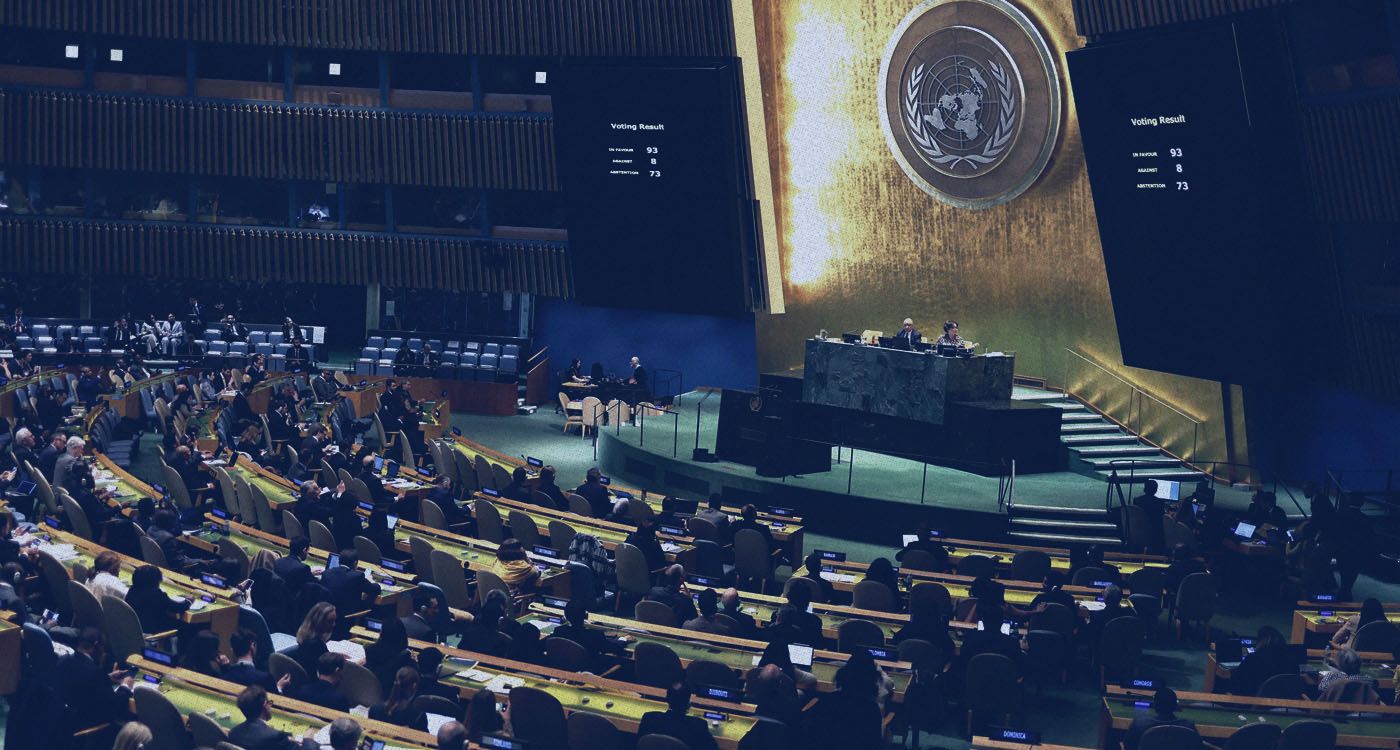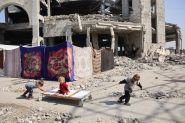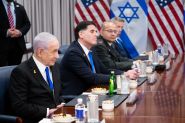- Home
- Middle East
- Palestine Recognition: A Symbolic Gesture Devoid of Substance

©AFP
On September 21, several Western capitals—including London, Ottawa, Lisbon and Canberra—announced the recognition of a Palestinian state. France is set to follow suit on Monday, with Emmanuel Macron confirming that Paris will formalize its decision at the United Nations.
The initiative, backed by a United Nations General Assembly resolution a few days earlier, is intended as a strong signal to “save” the two-state solution and address the humanitarian crisis in Gaza.
However, on the ground, little has changed: Palestinian governance remains fragile, Israeli security is still under threat and the conflict’s dynamics continue unabated.
More Symbolic Than Peace-Building
The Washington Institute, an American think tank, describes these recognitions as “performative,” aimed more at “looking good” to restless public opinion than at “doing good.”
According to the same think tank, the only recognition that truly matters to the Palestinians is Israel’s—not that of France or the United Kingdom. The tangible effect is minimal, aside from granting Hamas a symbolic political victory, even as Israeli hostages remain held in Gaza.
The Foundation for Defense of Democracies (FDD) highlights the legal criteria that define a state under the Montevideo Convention: a permanent population, an effective government, a defined territory and the capacity to engage in international relations.
Since 2007, the Palestinian Authority (PA) has not controlled Gaza, home to nearly 40% of the population of the prospective state. As a result, it cannot guarantee the enforcement of treaties or monopolize the use of force—core functions of a sovereign state. “Recognizing a state that does not meet these criteria amounts to weakening international norms,” warns the FDD, which sees a dangerous precedent that could be exploited by separatist movements elsewhere in Europe.
The Palestinian Authority: Incompetent and Corrupt
The Palestinian Authority itself also faces heavy criticism. President Mahmoud Abbas, elected in 2005 for a four-year term, remains in power 20 years later.
Polls from the Palestinian Center for Policy and Survey Research indicate that, as of May 2025, 81% of Palestinians were calling for his resignation.
Moreover, the American think tank Freedom House ranks the Palestinian territories among the most restrictive regimes in terms of rights and freedoms. Corruption is endemic, and the PA struggles to maintain control over its own cities, where Iran-linked Islamist militias enforce their own rule.
In Jenin and Nablus, entire areas have effectively come under the control of armed groups. The Tanzim, a militant faction originating from Fatah, has reestablished itself as an unchecked local force, while the Palestinian Islamic Jihad—directly funded and trained by Iran’s Revolutionary Guards—now coordinates its operations with Hamas through “joint command centers.”
According to the Jerusalem Center for Security and Foreign Affairs (JCSFA), the Revolutionary Guards have set up weapons-smuggling networks through Syria, Lebanon and Jordan, allowing the flow of assault rifles, RPGs, anti-tank mines and improvised explosives.
These militias have already produced their own rockets in Jenin, with the “Al-Ayash Battalion” claiming responsibility for several test launches from the West Bank between 2024 and 2025.
In Nablus, the Al-Aqsa Martyrs’ Brigades, formerly under the Fatah banner, now openly cooperate with Iranian advisers. The situation has deteriorated to the point that PA security forces no longer dare enter certain neighborhoods, which have effectively become armed strongholds.
As the JCSFA notes, the PA “now exercises only nominal authority over territories effectively controlled by Tehran-backed factions. If the PA cannot maintain order in its own cities, it would be incapable of securing a sovereign state.”
Post October 7: Israeli Security and Hostages, the Blind Spots of Recognition
For Israel, the diplomatic developments cannot be separated from the trauma of October 7, 2023. The Washington Institute observes that an overwhelming majority of Israelis, from left to right, see the prospect of a Palestinian state as the potential rise of a “new Gaza,” this time just nine kilometers from Tel Aviv.
The threat is viewed as existential: even light artillery could cripple the country’s vital infrastructure. Yet none of the Western recognitions are conditional on the release of hostages or the disarmament of Hamas—reinforcing the perception that a “reward is being handed to terrorism.”
In Paris and London, think tanks see the decision as driven by domestic calculations. The Washington Institute highlights Emmanuel Macron’s desire to reposition himself on the international stage amid a critical left and a tense social climate.
In the United Kingdom, Keir Starmer yields to pressure from his party and public opinion, shaped by images of famine in Gaza. The Atlantic Council goes further: without a concrete plan, the recognition remains “rhetoric”—useful for appeasing public sentiment but insufficient to change the regional balance of power.
Two States: An Orthodoxy on the Verge of Obsolescence?
The two-state solution remains the official framework of Western diplomacy. Yet many analysts now consider it obsolete. The JCSFA notes that the “less-than-a-state entity” described by former Israeli Prime Minister Yitzhak Rabin in 1995 still better reflects the reality on the ground than full sovereignty.
Rabin envisioned this as an expanded autonomy for the Palestinians, granting administrative powers but without the core attributes of a sovereign state, such as a standing army or full control over borders.
The Atlantic Council calls it an “orthodoxy inherited from Oslo,” out of touch with reality: ongoing settlement expansion, Israeli rejection, Palestinian fragmentation and Iranian exploitation.
Rather than symbolic gestures, the Washington Institute urges an operational plan for the “post-Gaza” period: securing the territory, demilitarization, transitional administration and deep reform of the Palestinian Authority.
According to the think tank, without such measures, recognition mainly bolsters extremists: in Israel, it offers an excuse for annexation; on the Palestinian side, it reinforces the emphasis on symbolism and intransigence.
Overall, last Sunday’s recognition sends a strong political signal but changes nothing on the ground. It does not secure the release of hostages, weaken Hamas, reform the Palestinian Authority or reassure Israelis. Without concrete conditions or a credible plan, it remains a symbolic gesture, a statement of political intent. Sadly, lofty slogans tend to make a lot of noise, no matter how far-fetched.
Read more



Comments